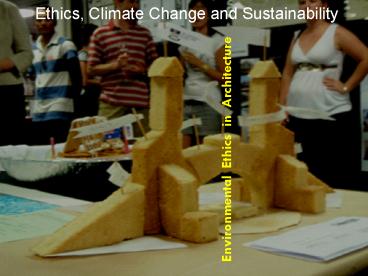Environmental Ethics in Architecture - PowerPoint PPT Presentation
1 / 15
Title:
Environmental Ethics in Architecture
Description:
or, in architecture, 'Who (or what) should be regarded as ... Shallow environmentalism and the precautionary principle: anthropocentric, humans dominate ... – PowerPoint PPT presentation
Number of Views:118
Avg rating:3.0/5.0
Title: Environmental Ethics in Architecture
1
Ethics, Climate Change and Sustainability
Environmental Ethics in Architecture
2
(No Transcript)
3
Practical Ethics
- Ethics Provides guidance for action.
Conventional Ethics Focuses on interpersonal
relations.
Environmental Ethics Provides guidance for
action that focuses on the welfare of the overall
environment (including humans) and not on
interpersonal relations.
Environmental Ethics in Architecture Provides
guidance for action in the practice of
architecture that focuses on the welfare of the
overall environment.
4
The Moral Class
- Who is due moral consideration? or, in
architecture, Who (or what) should be regarded
as stakeholders in our design decisions?
5
Three Categories of Environmental Ethics
- Shallow environmentalism and the precautionary
principle anthropocentric, humans dominate
- Intermediate environmentalism humans given
preference but other stakeholders considered
- Deep environmentalism no preference for humans
6
Another way of looking at thisA Theory of
General Ethics
7
- Warwick Fox puts forward the concept of
Responsive Cohesion. - He argues that responsive cohesion is a
foundational value a value we should live by
8
What is responsive cohesion?
- Cohesive phenomena exhibit a mutual
responsiveness of the component parts, as
distinct from regimented, forced, dogmatic or
formulaic alternatives, or the absence of any
cohesion.
9
What is responsive cohesion?
- Fox argues that informed judges consider cohesive
phenomena to be the best kind, whether in
architecture, politics, conversation, literature
or any other field of human activity.
10
There are three realms for responsive cohesion
- The biophysical (or natural) realm
- The social (or mindsharing) realm
- The compound material (or humanly constructed)
realm
- Place,
- People
- Stuff)
11
- Considerations about how a part achieves
responsive cohesion with its context should trump
considerations regarding the parts internal
cohesion. - The largest context is the biophysical
environment (sustaining the others) and the next
largest context is the social environment. - In designing a building, then, the responsive
cohesion between the building and its contexts
are more important than its internal cohesion,
but both are sought.
12
Some ethical questions
- Where are the system boundaries?
- Eg the eco-resort
- Are offsets valid?
- Eg the carbon-neutral jet flight
- Should we consider opportunity costs?
- Eg Saving the money and spending it in other ways
- Are symbolic gestures valid?
- Eg (most) PV panels on the roof
13
Ethics, Climate Change and Sustainability
- Sustainability is an attribute of cohesive
ecosystems (including human lifestyles and social
practices), not objects - The human practice of Architecture can help
facilitate more sustainable lifestyles and social
practices by other humans - but the notion of
sustainable buildings as objects is meaningless
14
The Ethical MessageResponsive cohesion is a
foundational valuein architecture, in tackling
climate change, in promoting sustainabilityand
in everything else
15
thank you































